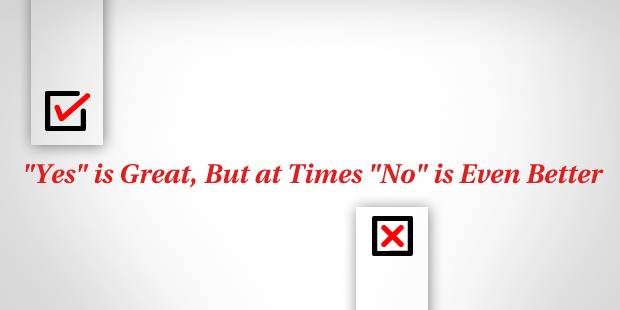
“Yes” is Great, But at Times “No” is Even Better
At work, we want our jobs, assignments, projects and “stuff” to move along smoothly: achieving objectives, getting promoted, winning contracts. It’s almost a twitch reflex to want our jobs to behave themselves. And if we are honest, sometimes we may even secretly wish that the workplace could deliver a continuous, uninterrupted “yes”—“yes” I got the plum job; “yes” the budget was approved; “yes” the redesign has been accepted.
And not only do we want “yes” from our jobs, we also want to deliver “yes” in return – especially when results are expected: “yes” we can deliver doubled digit growth; “yes” we’ll exceed the deadline and come in under budget; “yes” we can close the deal.
But, as we all know, work doesn’t behave this way. It’s far too unruly: deadlines are too tight, salary increases are too small, business deals wither. And often instead of saying hello to “Yes”, we find “No” at the front of the line offering personnel conflicts, career disappointments and project derailments. But rather than treating “no” as an annoying intruder on our journey to “yes”, maybe we could take a different approach—maybe “no” isn’t such a bad guy after all—maybe “no” is exactly what we’ve been looking for. And here are three reasons why.
Emphasizing “yes” can dull our edge
When we impulsively look for “yes” from our subordinates, colleagues, vendors and others, we tend to emphasize harmony over clarity; convenience over excellence; perception over results. Such seeming harmony can dull a team’s creative edge and mask issues that need our attention.
Are we emotionally confident enough to hear the facts rather than a “managed narrative”?
Do we rush past problems in order to get to a solution or can we linger and explore difficulties thoroughly?
Do we invite “no” from others when we sense that it is being held back?
When we appreciate the importance of “no”, convenience becomes irrelevant, our intelligent “edge” is permitted to clarify problems and getting a realistic picture takes priority.
Avoiding “no” represses candor and causes team problems
It is typical for team members to test boundaries and try to form reliable relationships and inevitably, such testing creates friction where individuals say “no” to certain group demands and limits. We all know what this looks like: Why does Sally get to lead this effort, why not me? Those budget estimates are way too low, but no one listens to me. I authored the sales plan, why can’t I present it? When we are uncomfortable with the emotions accompanying such conflict, we may tend to avoid the required candor, hurrying toward a false “yes” of familiar routines and politeness. When teams choose avoidance over candor, we can end up repressing feelings that later arise as simmering frustrations or at times active resistance. Too often, by avoiding “no” we disguise problems rather than solve them.
“No” creates much needed psychological space
Finally, when we are constantly chasing “yes” — trying to become smarter, faster, cheaper, and more profitable — we can at times speed past the very things that need our attention. Such speed to succeed can blind us, but “no” can slow us down and offer some psychological space:
Can we describe the top three difficulties our customers are having with the new release 4.0?
What is the employment turnover with our key sales folks and should it be lower?
What are the three main motivators for our medical affairs physicians and are we focusing in on them? These and hundreds of other similar business questions require us to slow down in our relentless pursuit of “yes” and consider “no” as an ally. And when we make friends with “no”, we discover psychological space and time to reflect, not just on where we are going but, as importantly, on how we are getting there.
So, in the end work is very much about “yes” — “yes“ I can take that stretch assignment; “yes” I’ll work extra hours; “yes”, the project is on track. But if work is all about “yes”, chances are we are avoiding some vital issues, and we may need to make friends with “no”.
Read more from Michael here.

Tags: Leadership Development, Leadership Engine, Michael Carroll, Staff











